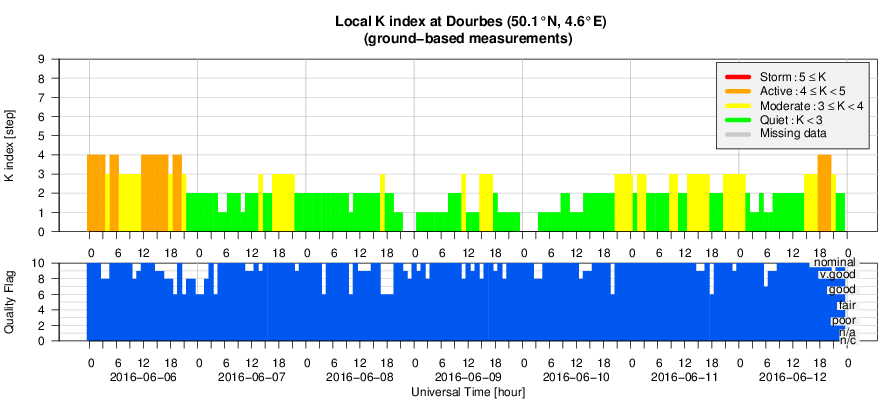- Table of Content
- 1.ESWW13 - a spa...
- 2.The annual STC...
- 3.PROBA2 Observa...
- 4.Review of sola...
- 5.The Internatio...
- 6.Geomagnetic Ob...
- 7.Review of iono...
- 8.Future Events
- 9.New documents ...
2. The annual STCE meeting in the picture
3. PROBA2 Observations (6 Jun 2016 - 12 Jun 2016)
4. Review of solar and geomagnetic activity
5. The International Sunspot Number
6. Geomagnetic Observations at Dourbes (6 Jun 2016 - 12 Jun 2016)
7. Review of ionospheric activity (6 Jun 2016 - 12 Jun 2016)
8. Future Events
9. New documents in the European Space Weather Portal Repository
ESWW13 - a space weather cocktail
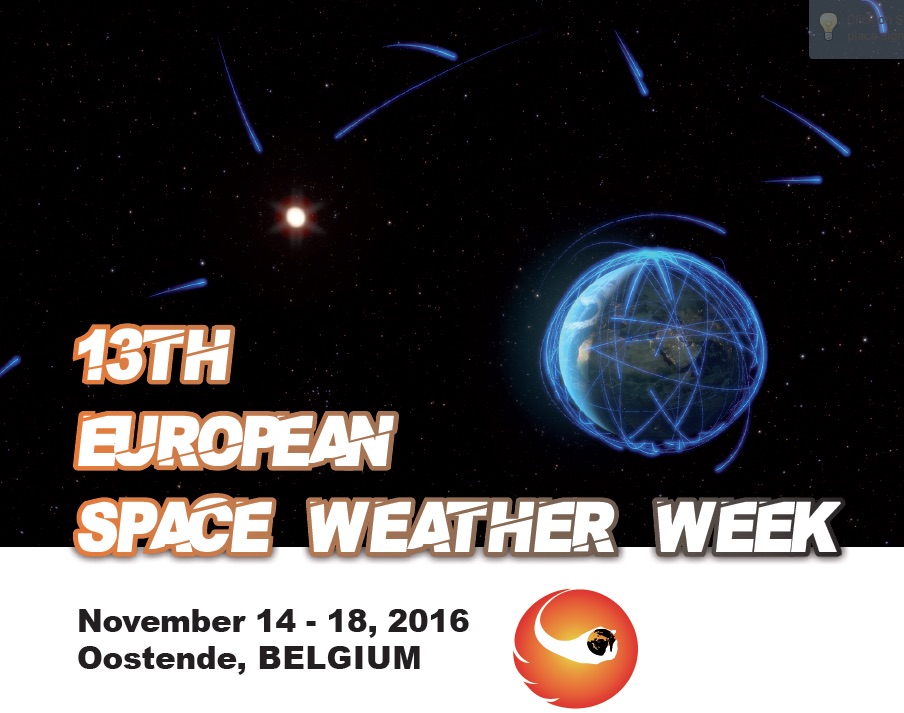
An event to look forward for the Space Weather Community is the annual European Space Weather Week, now in it's 13th edition.
Space Weather does have an impact on our society which is a network of industries and economy intertwined with science and space weather services. At ESWW13 we try to make the perfect cocktail of people and knowledge that makes us Space Weather proof and strengtens our safety net. Cheers!
Check the poster on http://www.stce.be/esww13/
The annual STCE meeting in the picture
The 2016 edition of the STCE annual meeting led us along Roof Top Science, Cosmic Rays, 10years STCE Happy Birthday cake and a launch to Wuthering Heights.
An impression of a successful day
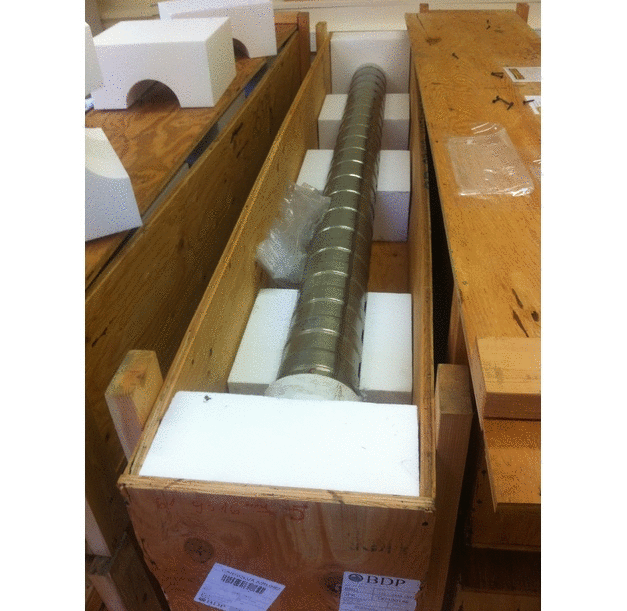
or check http://www.stce.be/sites/default/files/field/image/Annualmeeting_lr.gif
PROBA2 Observations (6 Jun 2016 - 12 Jun 2016)
Solar Activity
Solar flare activity fluctuated between very low and low during the week.
In order to view the activity of this week in more detail, we suggest to go to the following website from which all the daily (normal and difference) movies can be accessed:
http://proba2.oma.be/ssa
This page also lists the recorded flaring events.
A weekly overview movie can be found here (SWAP week 324).
http://proba2.oma.be/swap/data/mpg/movies/weekly_movies/weekly_movie_2016_06_06.mp4
Details about some of this week's events, can be found further below.
Friday Jun 10
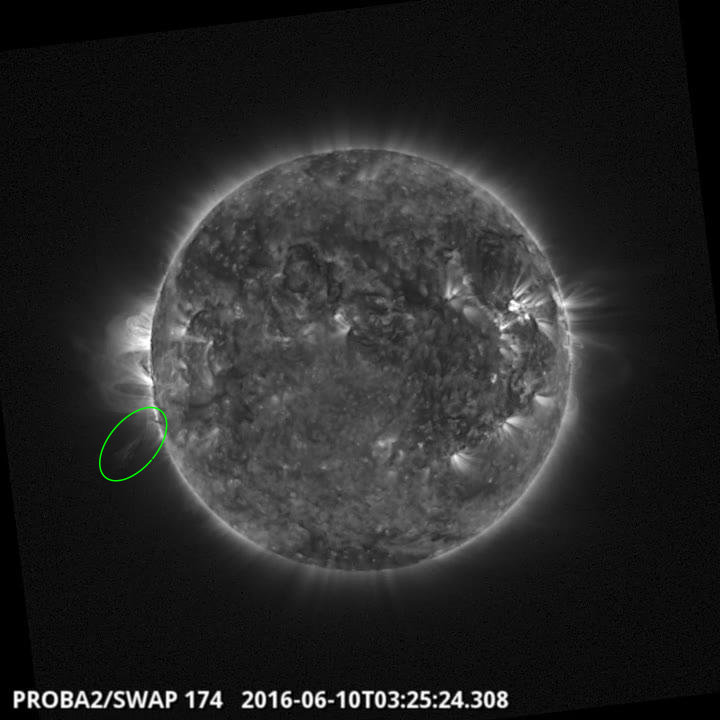
An eruption was observed by SWAP on the east limb of the Sun on 2016Jun10 at 03:25 UT
Find a movie of the events here (SWAP movie)
http://proba2.oma.be/swap/data/mpg/movies/20160610_swap_movie.mp4
Saturday Jun 11
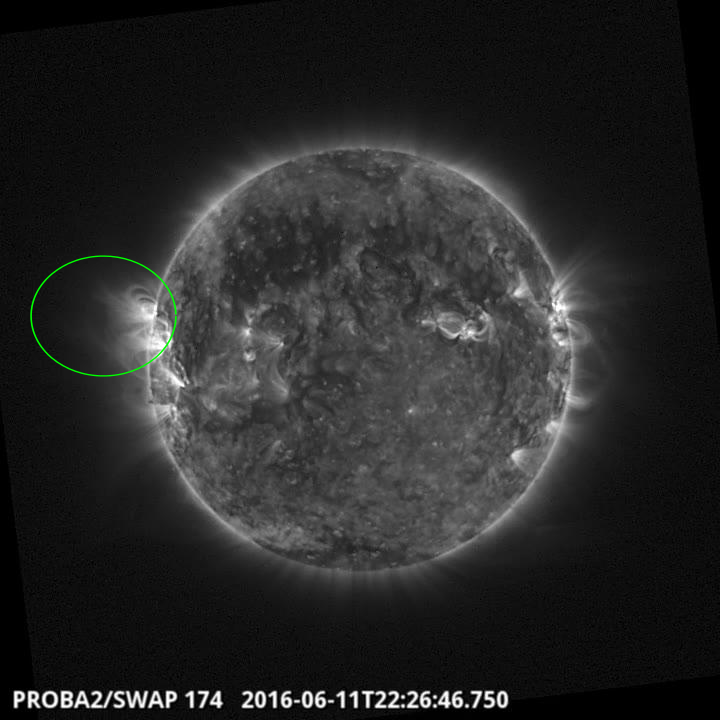
An eruption was observed by SWAP on the east limb of the Sun on 2016Jun11 at 22:26 UT
Find a movie of the events here (SWAP movie)
http://proba2.oma.be/swap/data/mpg/movies/20160611_swap_movie.mp4
Review of solar and geomagnetic activity
SOLAR ACTIVITY
The week started with a spotless Sun and the GOES X ray background at B1 level. Beta region NOAA AR 2552 appeared on Wednesday June 8 and was the source of all 4 C flares later this week.
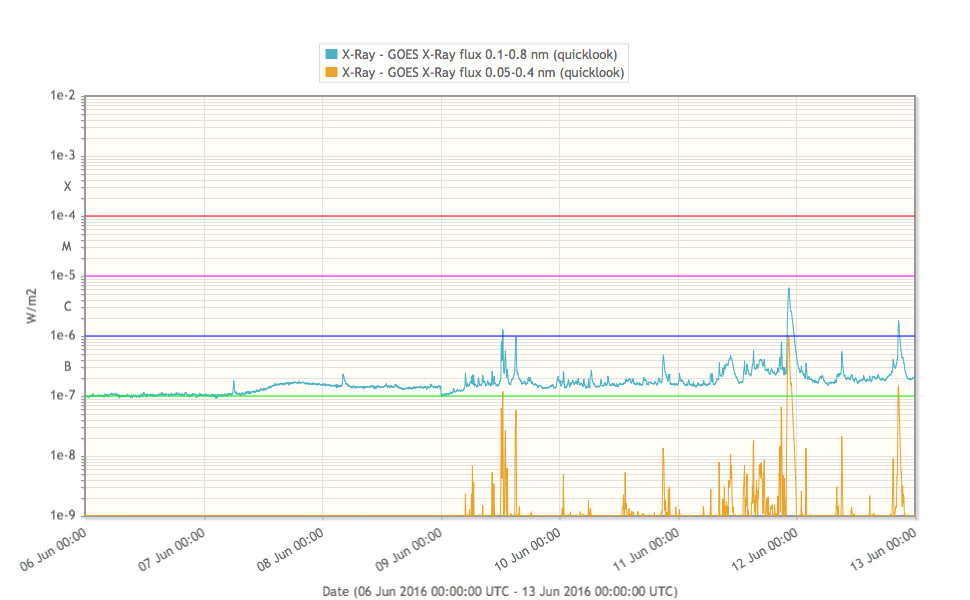
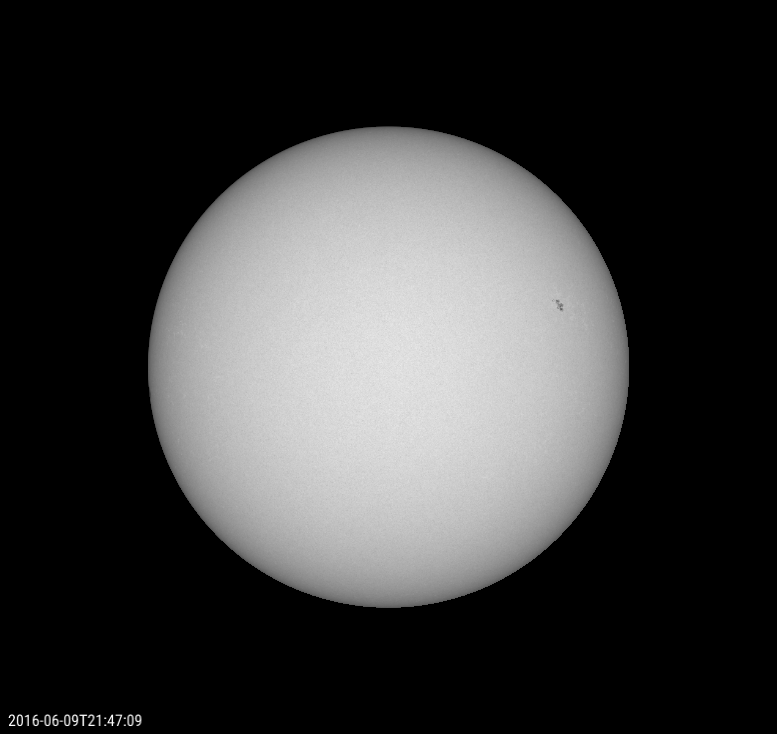
GEOMAGNETIC ACTIVITY
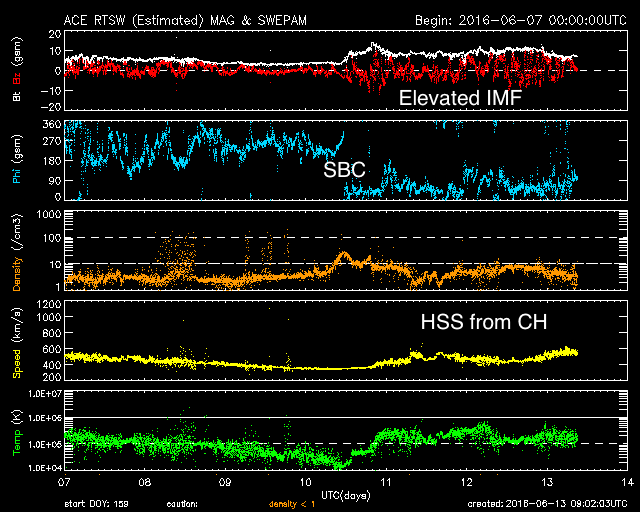
Following the passage of a coronal hole high speed stream in the weekend before, Kp reached one interval of minor geomagnetic storm (Kp=6) on Monday June 6. A sector boundary crossing (SBC) from negative to positive was observed in ACE data at 11:23 UT on June 10. From around 20h UT onwards, a high speed stream associated with a positive coronal hole (CH) gradually increased solar wind speeds from 360 km/s to a maximum of about 600 km/s.
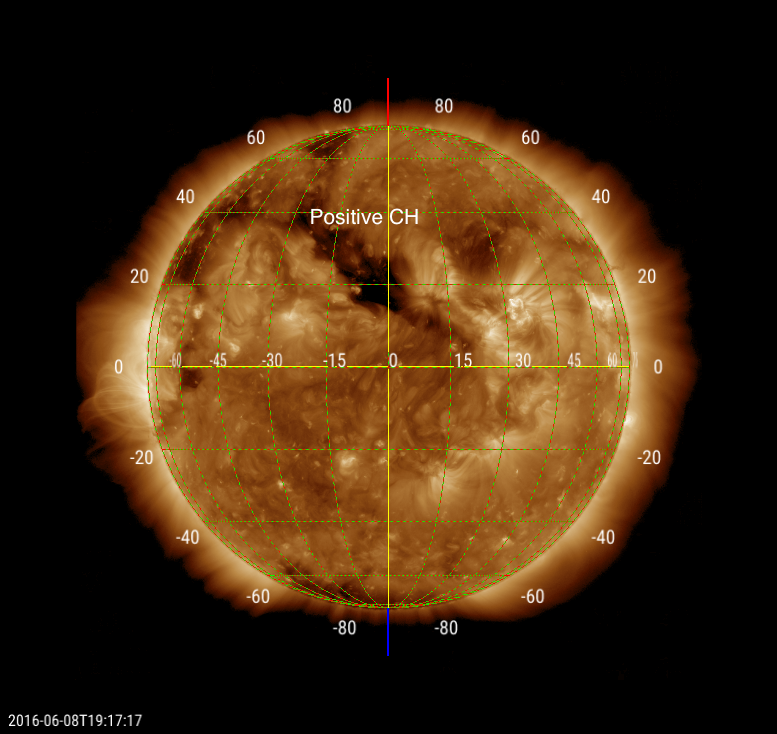
The magnitude of the Interplanetary Magnetic Field (IMF) rose from about 4 to 14 nT. The geomagnetic response did not exceed active levels.
The International Sunspot Number
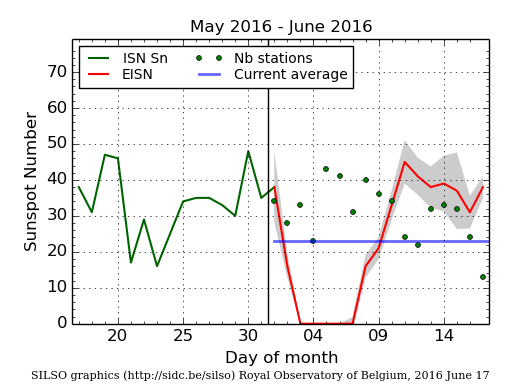
The daily Estimated International Sunspot Number (EISN, red curve with shaded error) derived by a simplified method from real-time data from the worldwide SILSO network. It extends the official Sunspot Number from the full processing of the preceding month (green line). The plot shows the last 30 days (about one solar rotation). The horizontal blue line shows the current monthly average, while the green dots give the number of stations included in the calculation of the EISN for each day.
Review of ionospheric activity (6 Jun 2016 - 12 Jun 2016)
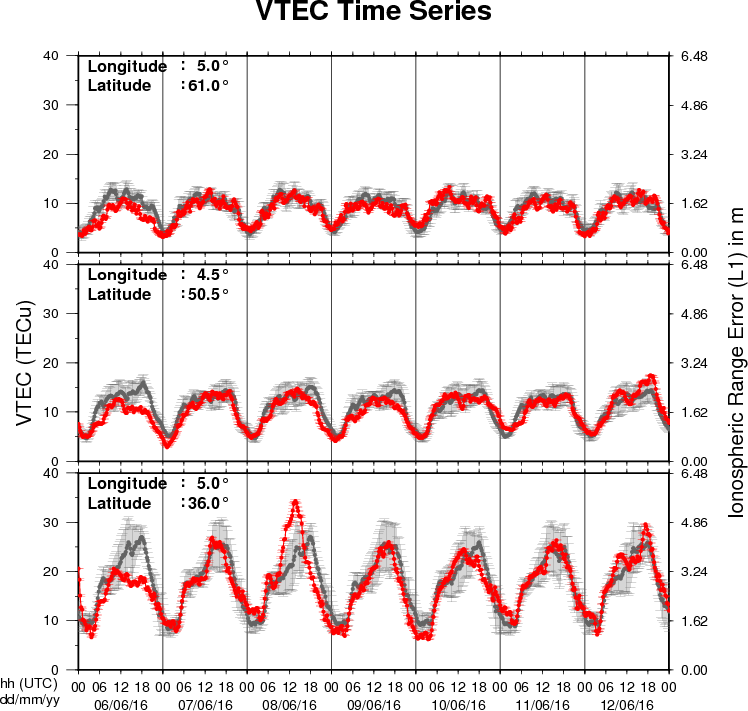
The figure shows the time evolution of the Vertical Total Electron Content (VTEC) (in red) during the last week at three locations:
a) in the northern part of Europe(N61°, 5°E)
b) above Brussels(N50.5°, 4.5°E)
c) in the southern part of Europe(N36°, 5°E)
This figure also shows (in grey) the normal ionospheric behaviour expected based on the median VTEC from the 15 previous days.
The VTEC is expressed in TECu (with TECu=10^16 electrons per square meter) and is directly related to the signal propagation delay due to the ionosphere (in figure: delay on GPS L1 frequency).
The Sun's radiation ionizes the Earth's upper atmosphere, the ionosphere, located from about 60km to 1000km above the Earth's surface.The ionization process in the ionosphere produces ions and free electrons. These electrons perturb the propagation of the GNSS (Global Navigation Satellite System) signals by inducing a so-called ionospheric delay.
See http://stce.be/newsletter/GNSS_final.pdf for some more explanations ; for detailed information, see http://gnss.be/ionosphere_tutorial.php
Future Events
For more details, see http://www.spaceweather.eu/en/event/future
The Scientific Foundation of Space Weather
Start : 2016-06-27 - End : 2016-07-01
Website:
http://www.issibern.ch/program/workshops.html
Global Modelling of the Space Weather Chain in Helsinki, Finland
Start : 2016-10-24 - End : 2016-10-28
This event brings together solar, heliospheric, magnetospheric,
and ionospheric communities to discuss the current state and future
challenges in global modelling of the entire space weather chain.
Major developments in forecasting space weather, and understanding
the effects of solar eruptions requires increased communication and
collaboration of these often rather distinct communities. We
welcome submissions from these modelling communities and also
synergetic studies utilising both observations and numerical
models.
Website:
https://pnst.ias.u-psud.fr/sites/pnst/files/global_modelling_space_weather_oct2016.pdf
European Space Weather Week in Ostend, Belgium
Start : 2016-11-14 - End : 2016-11-18
The ESWW is the main annual event in the European Space Weather
calendar. It is the European forum for Space Weather as proven by
the high attendance to the past editions. The agenda will be
composed of plenary/parallel sessions, working meetings and
dedicated events for service end-users. The ESWW will again adopt
the central aim of bringing together the diverse groups in Europe
working on different aspects of Space Weather.
Website:
http://www.stce.be/esww13/
Solar Orbiter Workshop 7: Exploring the solar environs in Granada, Spain
Start : 2017-04-03 - End : 2017-04-06
This event will be hosted by the Instituto de Astrofisica de
Andalucia - CSIC. Please mind that on April 7th the 20th SWT
meeting will take place at the same venue.
Website: Unkown
New documents in the European Space Weather Portal Repository
See http://www.spaceweather.eu/en/repository
STCE - Cosmic Rays workshop: A brief history of the cosmic ray monitoring at RMI
Presentation given at the Cosmic Rays workshop
Check https://events.oma.be/indico/event/10/
http://www.spaceweather.eu/en/repository/show?id=602
STCE - Cosmic Rays workshop: Introduction and Research topics
Presentation given at the Cosmic Rays workshop
check https://events.oma.be/indico/event/10/
http://www.spaceweather.eu/en/repository/show?id=603
STCE - Cosmic Rays workshop: The Neutronminitor database (NMDB) and its applications to space weather
Presentation given at the Cosmic Rays workshop
check https://events.oma.be/indico/event/10/
http://www.spaceweather.eu/en/repository/show?id=604
STCE - Cosmic Rays workshop: GLE alerts as input for SEP forecasts
Presentation given at the Cosmic Rays workshop
check https://events.oma.be/indico/event/10/
http://www.spaceweather.eu/en/repository/show?id=605
STCE - Cosmic Rays workshop: Cosmic rays and dosimetry at aviation altitudes
Presentation given at the Cosmic Rays workshop
check https://events.oma.be/indico/event/10/
http://www.spaceweather.eu/en/repository/show?id=606
STCE - Cosmic Rays workshop: Radiation hazards for astronauts
Presentation given at the Cosmic Rays workshop
check https://events.oma.be/indico/event/10/
http://www.spaceweather.eu/en/repository/show?id=607
